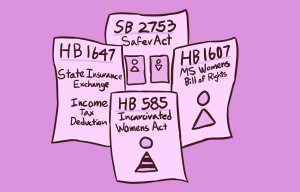
Mississippi lawmakers have recently introduced bills that would place restrictions on LGBTQ+ Mississippians. Although most bills did not make it out of committee, four bills are advancing.
House Bill 1607 creates the Mississippi Women’s Bill of Rights. The bill defines biological sex and states that, “Biological differences between the sexes are enduring and, in some circumstances, may warrant the creation of separate social, education, athletic or other spaces in order to ensure safety or allow members of each sex to succeed and thrive.”
House Bill 585 creates the Dignity and Safety for Incarcerated Women Act. It states that bathrooms, changing rooms and sleeping areas are limited to the use of members of one sex and prohibits any incarcerated individual from entering these spaces unless he or she is a member of that sex. The bill was amended to also regulate student housing at public universities.
Senate Bill 2753 creates the Safer Act, which prohibits individuals from using restrooms in public buildings that do not correspond with their biological sex. Public buildings must provide either single-sex restrooms and changing areas or unisex restrooms for individual use.
House Bill 1647 authorizes the implementation of a state insurance exchange, as well as income tax deduction. It authorizes the commissioner of insurance to “establish any program or promulgate any rule, policy, guideline or plan or change any program, rule, policy or guideline to implement, establish, create, administer or otherwise operate a health insurance exchange.”
The Daily Mississippian reached out to the authors of the bills for a comment but received no response prior to publication.
Rob Hill, Mississippi state director for the Human Rights Campaign, said that HRC is fighting against these bills.
“These are bills that we are hoping that we can fight,” Hill said. “We are engaging our members around the state and calling the legislature, lieutenant governor and speaker in an attempt to kill these bills on the floor. Mississippi is unfortunately one of the states where we see an onslaught of anti-LGBTQ+ legislation.”
Freshman psychology major Skyller Sing gave her opinion on the events in the Mississippi Legislature.
“Bills such as House Bill 585 and Senate Bill 2753, as well as the other two bills, could have detrimental and possibly deadly consequences for transgender and gender non-conforming individuals,” Sing said. “Not allowing individuals to use facilities that best align with how they identify not only puts them in mental (danger), but physical danger as well.”
McKenna Raney-Gray, the LGBTQ Justice Project staff attorney for the American Civil Liberties Union of Mississippi, said that the bills target LGBTQ+ people who have the least amount of protection structurally.
“I remain disheartened at all the potential legislation on schools and attacking people who have the least amount of protection structurally in our society. I wish that’s not what I was doing during the legislative session, but it is,” Raney-Gray said.
Currently, the ACLU is tracking 479 anti-LGBTQ+ bills in the U.S., with 19 of those in Mississippi. Even though many of the bills do not make it out of the committee, they may cause harm to the LGBTQ+ community.
“We’re in the midst of an explosion in bills from one year to the next. Last year, our high water mark was 31 bills that negatively affected LGBTQ+ people in Mississippi.” Raney-Gray said. “LGBTQ+ people are a discreet minority that is easy to identify and discriminate against in a way that is exciting to some base voters or is interesting to some people who are not usually affected by the legislation itself, so it’s used as a tactic to discriminate and attack a minority group for political gain.”
Cullen Peele, press secretary for the Human Rights Campaign, said that the bills are not being passed for a policy issue; they are meant to stir up stigma and hate against the LGBTQ+ community.
“These bills by no means are meant to tackle a policy issue. It’s purely meant to stir up stigma [and] discrimination, and roll back the clock on rights that have been gained by LGBTQ+ people nationally, which is the reason why these bills are proliferating all over the country, but also in Mississippi especially. These bills are again meant to stir up a lot of hate and stigma and it is especially the case when there’s so many pressing issues involving, for example, public education,” Peele said.
Sing shared her perspective as an LGBTQ+ Mississippian.
“As an LGBT+ individual who has lived in Mississippi their entire life, it is important to me that we see progress,” Sing said. “Our state has quite a reputation for being a very hateful body, and I believe that it’s about time we show that there are individuals in this state that care about those who are underrepresented. Basic human rights are a necessity, not a privilege.”



























